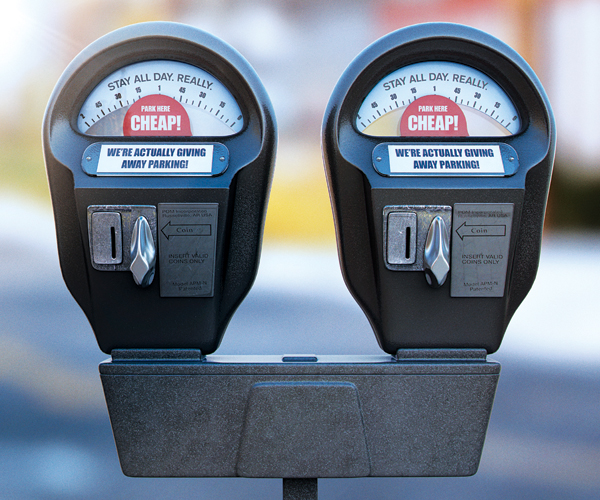Is ‘Demand Pricing’ at Parking Meters Like Uber’s Surge Pricing?

ILLUSTRATION BY PETER CROWTHER/DEBUT for “Cheap Lot”
Mayor Marty Walsh announced plans yesterday to install smart parking meters citywide, which may someday allow the city to adjust the prices of on-street parking to respond to demand. Here’s how demand pricing works: When parking spots are hard to find, say at midday on Newbury Street, the city could raise meter prices, scaring some drivers off, keeping more spots free, and preventing people from clogging up the roads by circling the block and double parking. All good things! But the system, many people have pointed out, sounds a lot like another, less popular dynamic pricing scheme: Uber’s surge pricing.
Surge pricing on apps like Uber and Lyft works similarly by raising fares in times of higher demand by applying a precisely calculated “fare multiplier.” Only those willing to pay some multiple of the usual cost will hail a car, keeping the app experience smoother for everyone. Surge pricing has caused Uber a lot of PR headaches through the years because what looks like elegance to a microeconomist can seem like price gouging to a customer. Do the frequent comparisons to demand-based meter pricing suggest a cautionary tale for cities like Boston as they consider the new scheme?
You can certainly see how the more vocal citizens of Boston might react poorly to the occasional discovery that their meter price is higher than usual. Uber’s surge pricing has gotten the company in the most trouble when users have been surprised by their enormous bills. The company now forces you to type out the surge multiplier in order to show that you understand when ordering a car that surge pricing is in effect. Drivers might similarly find themselves shocked when, upon finding a parking spot, they discover that the meter price is $6/hour.
In San Francisco, which has piloted this kind of parking system, the solution has been to produce apps that tell users how much meters currently cost at specific locations. But for those who don’t think to check the app, the element of surprise might be an unwelcome one. And while Uber has stood by its surge pricing scheme in the face of public backlash, Boston’s parking prices will be put in place by politicians, who might be more willing to back down in the face of public disapproval.
That said, the parking program is up and running in San Francisco where it seems to be working fine. Three years after the city implemented it, they are trumpeting its benefits. Blocks are full 16 percent less often, for instance, and the average time people spend looking for parking decreased by 5 minutes. In San Francisco, meter prices range from $0.25 to $6 per hour. Perhaps the city escapes the kind of ire aimed at Uber because we’re just not talking about that much money, certainly not when you compare with tales of $357 Uber bills.
Another key difference: Uber never cuts fares in times of lower demand. But San Francisco cuts meter rates in low-demand neighborhoods, so much so that the average meter rate actually dropped after the program was implemented. That counterbalance might give people more tolerance when they stumble upon a $6/hour meter by Fenway on a game night. Dynamic meter pricing might share similarities with Uber’s surge pricing. But that shouldn’t scare city leaders away from trying it out.

